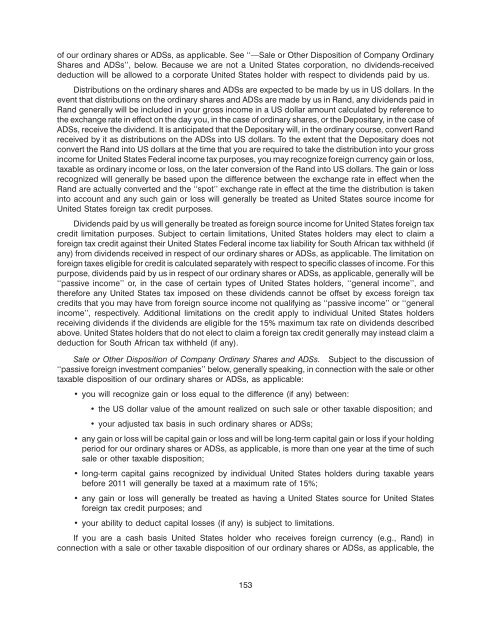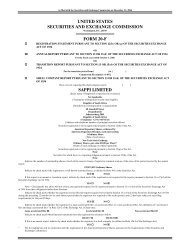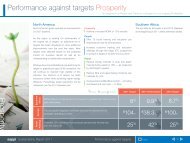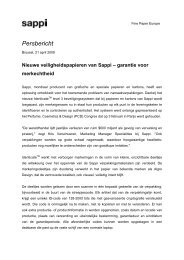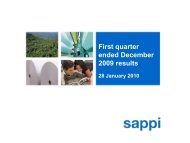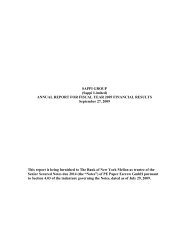You also want an ePaper? Increase the reach of your titles
YUMPU automatically turns print PDFs into web optimized ePapers that Google loves.
of our ordinary shares or ADSs, as applicable. See ‘‘—Sale or Other Disposition of Company Ordinary<br />
Shares and ADSs’’, below. Because we are not a United States corporation, no dividends-received<br />
deduction will be allowed to a corporate United States holder with respect to dividends paid by us.<br />
Distributions on the ordinary shares and ADSs are expected to be made by us in US dollars. In the<br />
event that distributions on the ordinary shares and ADSs are made by us in Rand, any dividends paid in<br />
Rand generally will be included in your gross income in a US dollar amount calculated by reference to<br />
the exchange rate in effect on the day you, in the case of ordinary shares, or the Depositary, in the case of<br />
ADSs, receive the dividend. It is anticipated that the Depositary will, in the ordinary course, convert Rand<br />
received by it as distributions on the ADSs into US dollars. To the extent that the Depositary does not<br />
convert the Rand into US dollars at the time that you are required to take the distribution into your gross<br />
income for United States Federal income tax purposes, you may recognize foreign currency gain or loss,<br />
taxable as ordinary income or loss, on the later conversion of the Rand into US dollars. The gain or loss<br />
recognized will generally be based upon the difference between the exchange rate in effect when the<br />
Rand are actually converted and the ‘‘spot’’ exchange rate in effect at the time the distribution is taken<br />
into account and any such gain or loss will generally be treated as United States source income for<br />
United States foreign tax credit purposes.<br />
Dividends paid by us will generally be treated as foreign source income for United States foreign tax<br />
credit limitation purposes. Subject to certain limitations, United States holders may elect to claim a<br />
foreign tax credit against their United States Federal income tax liability for South African tax withheld (if<br />
any) from dividends received in respect of our ordinary shares or ADSs, as applicable. The limitation on<br />
foreign taxes eligible for credit is calculated separately with respect to specific classes of income. For this<br />
purpose, dividends paid by us in respect of our ordinary shares or ADSs, as applicable, generally will be<br />
‘‘passive income’’ or, in the case of certain types of United States holders, ‘‘general income’’, and<br />
therefore any United States tax imposed on these dividends cannot be offset by excess foreign tax<br />
credits that you may have from foreign source income not qualifying as ‘‘passive income’’ or ‘‘general<br />
income’’, respectively. Additional limitations on the credit apply to individual United States holders<br />
receiving dividends if the dividends are eligible for the 15% maximum tax rate on dividends described<br />
above. United States holders that do not elect to claim a foreign tax credit generally may instead claim a<br />
deduction for South African tax withheld (if any).<br />
Sale or Other Disposition of Company Ordinary Shares and ADSs. Subject to the discussion of<br />
‘‘passive foreign investment companies’’ below, generally speaking, in connection with the sale or other<br />
taxable disposition of our ordinary shares or ADSs, as applicable:<br />
you will recognize gain or loss equal to the difference (if any) between:<br />
the US dollar value of the amount realized on such sale or other taxable disposition; and<br />
your adjusted tax basis in such ordinary shares or ADSs;<br />
any gain or loss will be capital gain or loss and will be long-term capital gain or loss if your holding<br />
period for our ordinary shares or ADSs, as applicable, is more than one year at the time of such<br />
sale or other taxable disposition;<br />
long-term capital gains recognized by individual United States holders during taxable years<br />
before 2011 will generally be taxed at a maximum rate of 15%;<br />
any gain or loss will generally be treated as having a United States source for United States<br />
foreign tax credit purposes; and<br />
your ability to deduct capital losses (if any) is subject to limitations.<br />
If you are a cash basis United States holder who receives foreign currency (e.g., Rand) in<br />
connection with a sale or other taxable disposition of our ordinary shares or ADSs, as applicable, the<br />
153


